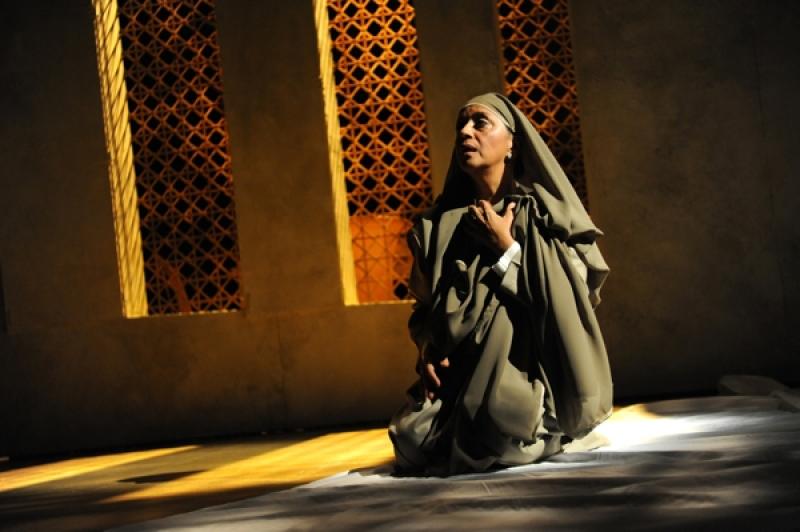The House of Bilquis Bibi, Hampstead Theatre | reviews, news & interviews
The House of Bilquis Bibi, Hampstead Theatre
The House of Bilquis Bibi, Hampstead Theatre
Tamasha Theatre's Pakistani take on Lorca may be for Asians only

What makes a good piece of theatre? Is it the atmosphere generated? Is it the acting? Or is it the ability to communicate ideas clearly? I don’t mind if sometimes I can’t hear or understand words. In the past, I have been overwhelmed by Polish versions of Dostoyevsky’s The Idiot. I have watched open-mouthed at Kabuki without surtitles and when Federico Garcia Lorca’s Yerma was first seen in this country, in Peter Daubeny’s World Theatre seasons, back in the Sixties, you hardly needed to understand Spanish to be so desperately moved by the sense of yearning emanating from a production played out on a giant trampoline that looked like an enormous cat’s cradle. Lorca, it turns out, is the chosen author for a new production that has its own issues.
What makes a good piece of theatre? Is it the atmosphere generated? Is it the acting? Or is it the ability to communicate ideas clearly? I don’t mind if sometimes I can’t hear or understand words. In the past, I have been overwhelmed by Polish versions of Dostoyevsky’s The Idiot. I have watched open-mouthed at Kabuki without surtitles and when Federico Garcia Lorca’s Yerma was first seen in this country, in Peter Daubeny’s World Theatre seasons, back in the Sixties, you hardly needed to understand Spanish to be so desperately moved by the sense of yearning emanating from a production played out on a giant trampoline that looked like an enormous cat’s cradle. Lorca, it turns out, is the chosen author for a new production that has its own issues.
Add comment
The future of Arts Journalism
You can stop theartsdesk.com closing!
We urgently need financing to survive. Our fundraising drive has thus far raised £49,000 but we need to reach £100,000 or we will be forced to close. Please contribute here: https://gofund.me/c3f6033d
And if you can forward this information to anyone who might assist, we’d be grateful.

Subscribe to theartsdesk.com
Thank you for continuing to read our work on theartsdesk.com. For unlimited access to every article in its entirety, including our archive of more than 15,000 pieces, we're asking for £5 per month or £40 per year. We feel it's a very good deal, and hope you do too.
To take a subscription now simply click here.
And if you're looking for that extra gift for a friend or family member, why not treat them to a theartsdesk.com gift subscription?
more Theatre
 Hamlet, National Theatre review - turning tragedy to comedy is no joke
Hiran Abeyeskera’s childlike prince falls flat in a mixed production
Hamlet, National Theatre review - turning tragedy to comedy is no joke
Hiran Abeyeskera’s childlike prince falls flat in a mixed production
 Rohtko, Barbican review - postmodern meditation on fake and authentic art is less than the sum of its parts
Łukasz Twarkowski's production dazzles without illuminating
Rohtko, Barbican review - postmodern meditation on fake and authentic art is less than the sum of its parts
Łukasz Twarkowski's production dazzles without illuminating
 Lee, Park Theatre review - Lee Krasner looks back on her life as an artist
Informative and interesting, the play's format limits its potential
Lee, Park Theatre review - Lee Krasner looks back on her life as an artist
Informative and interesting, the play's format limits its potential
 Measure for Measure, RSC, Stratford review - 'problem play' has no problem with relevance
Shakespeare, in this adaptation, is at his most perceptive
Measure for Measure, RSC, Stratford review - 'problem play' has no problem with relevance
Shakespeare, in this adaptation, is at his most perceptive
 The Importance of Being Earnest, Noël Coward Theatre review - dazzling and delightful queer fest
West End transfer of National Theatre hit stars Stephen Fry and Olly Alexander
The Importance of Being Earnest, Noël Coward Theatre review - dazzling and delightful queer fest
West End transfer of National Theatre hit stars Stephen Fry and Olly Alexander
 Get Down Tonight, Charing Cross Theatre review - glitz and hits from the 70s
If you love the songs of KC and the Sunshine Band, Please Do Go!
Get Down Tonight, Charing Cross Theatre review - glitz and hits from the 70s
If you love the songs of KC and the Sunshine Band, Please Do Go!
 Punch, Apollo Theatre review - powerful play about the strength of redemption
James Graham's play transfixes the audience at every stage
Punch, Apollo Theatre review - powerful play about the strength of redemption
James Graham's play transfixes the audience at every stage
 The Billionaire Inside Your Head, Hampstead Theatre review - a map of a man with OCD
Will Lord's promising debut burdens a fine cast with too much dialogue
The Billionaire Inside Your Head, Hampstead Theatre review - a map of a man with OCD
Will Lord's promising debut burdens a fine cast with too much dialogue
 50 First Dates: The Musical, The Other Palace review - romcom turned musical
Date movie about repeating dates inspires date musical
50 First Dates: The Musical, The Other Palace review - romcom turned musical
Date movie about repeating dates inspires date musical
 Bacchae, National Theatre review - cheeky, uneven version of Euripides' tragedy
Indhu Rubasingham's tenure gets off to a bold, comic start
Bacchae, National Theatre review - cheeky, uneven version of Euripides' tragedy
Indhu Rubasingham's tenure gets off to a bold, comic start

Comments
...
...
...
...
...
...
...
...
...
...
...
...
...
...
...
...
...
...
...
...
...
...
...
...
...
...
...